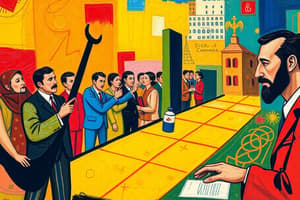Podcast
Questions and Answers
What is a political economy?
What is a political economy?
The political economy of a nation refers to how the political, economic, and legal systems of a country are interdependent.
What is a political system?
What is a political system?
The system of government in a nation.
What does collectivism emphasize?
What does collectivism emphasize?
Collectivism stresses the primacy of collective goals over individual goals.
How does modern-day socialism look?
How does modern-day socialism look?
What is individualism?
What is individualism?
What is democracy?
What is democracy?
What is totalitarianism?
What is totalitarianism?
Which forms of totalitarianism exist today?
Which forms of totalitarianism exist today?
What is the link between political ideology and economic systems?
What is the link between political ideology and economic systems?
What are the types of economic systems?
What are the types of economic systems?
Study Notes
Political Economy
- The relationship between a nation's political, economic, and legal systems.
- They interact and influence each other.
- This relationship impacts the level of economic well-being within a nation.
Political Systems
- Assessed based on the emphasis on collectivism vs. individualism.
- Also assessed based on the degree of democracy vs. totalitarianism.
Collectivism
- Prioritizes collective goals over individual goals.
- Rooted in the philosophy of Plato.
- Modern collectivism is associated with socialism, advocated by Karl Marx.
- Socialists believe in state ownership of production, distribution, and exchange, aiming to benefit society as a whole.
Modern-Day Socialism
- Split into Communism and Social Democracy.
- Communism believes in achieving socialism through violent revolution and totalitarian dictatorship.
- Social Democracy seeks to achieve socialism through democratic means.
- Many countries have moved towards free market economies, leading to the privatization of state-owned enterprises.
Individualism
- Emphasizes individual freedom in economic and political pursuits.
- Traces its origins back to Aristotle.
- Values individual diversity and private ownership.
- Believes in democratic political systems and free market economies.
Democracy
- A government system where power lies with the people, either directly or through elected representatives.
- Often associated with individualism.
- Pure democracy involves direct citizen participation in decision-making.
- Most modern democratic states utilize representative democracy, with citizens electing representatives.
Totalitarianism
- A form of government where one person or political party exercises absolute control over all aspects of life, suppressing opposition.
Types of Totalitarianism
- Communist: Power monopolized by a communist party.
- Theocratic: Power monopolized by a religious entity.
- Tribal: Power monopolized by a party representing a specific tribe.
- Right-wing: Allows some economic freedom but restricts individual political freedom.
Political Ideology and Economic Systems
- Closely linked.
- Nations that prioritize individual goals tend to have market-based economies.
- Countries with prevalent state-ownership emphasize collective goals.
Economic Systems
- Market Economies: Privately owned businesses, production determined by supply and demand.
- Government promotes fair competition.
- Command Economies: The government has complete control over production, quantity, and pricing.
- All businesses are state-owned.
Studying That Suits You
Use AI to generate personalized quizzes and flashcards to suit your learning preferences.
Related Documents
Description
Explore the intricate relationship between political, economic, and legal systems in this quiz on political economy. Understand how collectivism and modern-day socialism inform political structures from democracy to totalitarianism. Test your knowledge on key concepts, significant figures, and modern interpretations.



